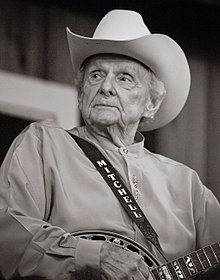Ralph Stanley
| Ralph Stanley | |
|---|---|

Dr. Ralph Stanley in 2011
|
|
| Background information | |
| Birth name | Ralph Edmund Stanley |
| Also known as | "Dr. Ralph Stanley" |
| Born |
February 25, 1927 McClure, Virginia, U.S. |
| Origin | Big Spraddle Creek, Virginia, U.S. |
| Died | June 23, 2016 (aged 89) Coeburn, Virginia, U.S. |
| Genres | Bluegrass, old-time, folk |
| Occupation(s) | Bluegrass musician |
| Instruments | Banjo |
| Years active | 1946–2016 |
| Labels | Columbia, Rebel |
| Associated acts | Clinch Mountain Boys, Stanley Brothers |
| Website | drralphstanleymusic |
Ralph Edmund Stanley (February 25, 1927 – June 23, 2016), also known as Dr. Ralph Stanley, was an American bluegrass artist, known for his distinctive singing and banjo playing. Stanley began playing music in 1946, originally with his brother Carter as part of The Stanley Brothers, and most often as the leader of his band, The Clinch Mountain Boys.
He was part of the first generation of bluegrass musicians and was inducted into both the International Bluegrass Music Hall of Honor and the Grand Ole Opry.
Ralph Edmond Stanley was born, grew up, and lived in rural Southwest Virginia—"in a little town called McClure at a place called Big Spraddle, just up the holler" from where he moved in 1936 and lived ever since in Dickenson County. The son of Lee and Lucy Stanley, Ralph did not grow up around a lot of music in his home. As he says, his "daddy didn't play an instrument, but sometimes he would sing church music. And I'd hear him sing songs like 'Man of Constant Sorrow,' 'Pretty Polly' and 'Omie Wise.'"
I got my first banjo when I was a teenager. I guess I was 15, 16 years old. My aunt had this old banjo, and Mother bought it for me ... paid $5 for it, which back then was probably like $5,000. [My parents] had a little store, and I remember my aunt took it out in groceries.
He learned to play the banjo, clawhammer style, from his mother:
She had 11 brothers and sisters, and all of them could play the five-string banjo. She played gatherings around the neighborhood, like bean stringin's. She tuned it up for me and played this tune, "Shout Little Luly," and I tried to play it like she did. But I think I developed my own style of the banjo.
He graduated from high school on May 2, 1945 and was inducted into the Army on May 16, serving "little more than a year." He immediately began performing when he got home:
...
Wikipedia
